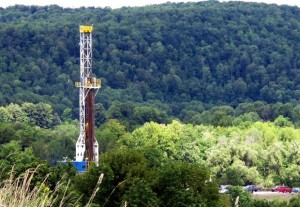DCNR grapples with noisy gas compressors in state forests

Scientists say noise from drill rigs, like this one in Tioga State Forest, are less of a concern than than the long-term noise disturbances caused by gas compressor stations.
The state Department of Conservation and Natural Resources (DCNR) is trying to deal with a complicated question– how annoying are gas compressor stations?
DCNR’s newly formed Natural Gas Advisory Committee was set up to assist the agency in managing gas drilling on state forest lands. About 700,000 of Pennsylvania’s 2.2 million acres of public forest land are available for drilling.
At the advisory committee’s second meeting in State College yesterday, DCNR staff focused on gas compressor stations– noting there are currently nine in state forest lands. They said that number is expected to grow to between 100-200.
“They’re loud and we’re getting complaints,” said DCNR Bureau of Forestry staffer Zack Roeder, “What should the guideline be? I’m not sure.”
Compressors are necessary to clean, treat, and pressurize natural gas in order to deliver it through pipelines. DCNR’s current guidelines say the noise cannot exceed 55 decibels, 300 feet away from a compressor station.
But many members of the committee–which includes representatives from industry and environmental groups–agree that guideline is not nuanced enough to address noise disturbance.
Penn State professor of acoustics Tom Gabrielson gave a presentation to the group showing why noise is so complex.
He began by playing several different sounds: a helicopter, highway road noise, heavy rain, birds singing, and dogs barking. Gabrielson said all had equivalent noise levels but, “are radically different in terms of perception.”
Many other factors including topography and weather can make a difference in terms of how sound travels and is perceived. Patrick Drohan, an associate professor in Penn State’s department of Ecosystem Science and Management pointed out that sound frequency matters too.
“Very loud sounds can bring about very big emotions,” he said. “Very low sounds can drive people batty.”
Noise isn’t only a bother to humans, it can also disrupt wildlife habitats as well as breeding and communication patterns. It has different impacts on different species.
“I think a lot of good questions are being raised,” said committee member Tom Yarnick of XTO Energy. “It just shows that we don’t know what the standards should be.”
The committee discussed the possibility of doing a pilot study to get a closer examination of the noise associated with gas compressors in the near future.
“In many ways this Marcellus gas development is new for everybody,” said committee chairman and Penn State forestry professor Jim Grace. “We’re developing guidelines where none existed before.”
















